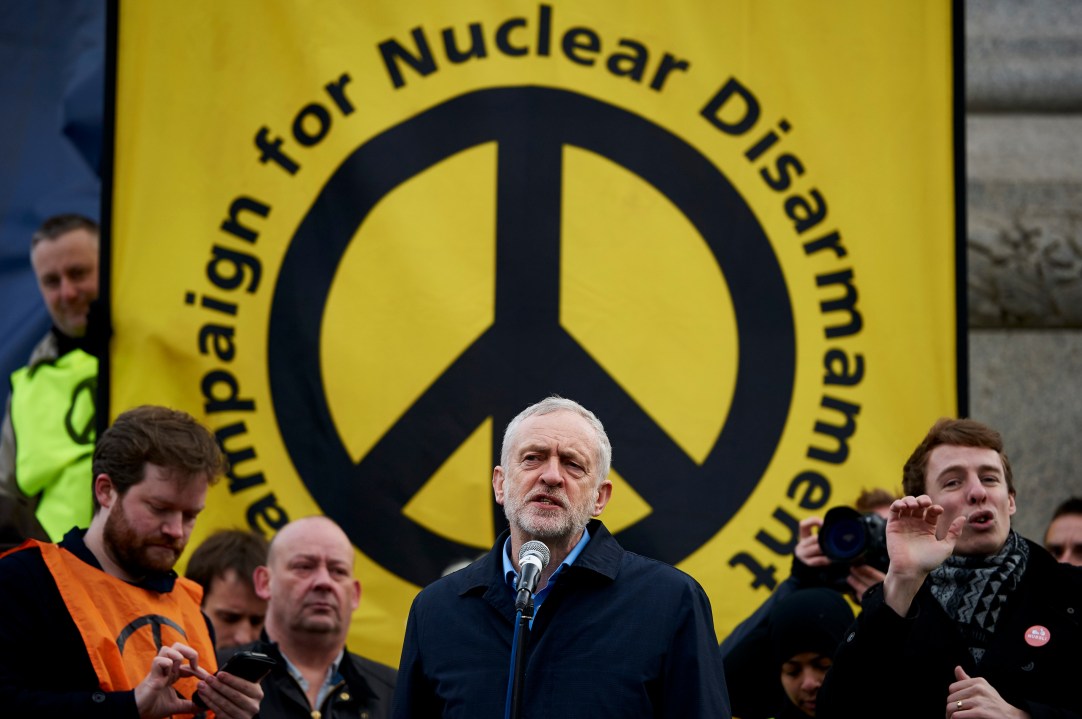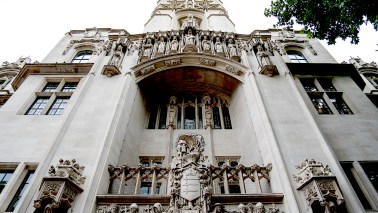As a general rule politicians should spend less time saying things they do not really believe. However useful such a strategy may be in the short-term it will, sure as eggs be eggs, backfire on you eventually. But there are also occasions when it is a mistake to talk about the things in which you really do believe. This is something Jeremy Corbyn has yet to understand.
So there was the gallant Labour leader speaking at a sparsely-attended anti-Trident rally in Trafalgar Square at the weekend, thereby reinforcing many of the back-to-1983 associations that will help ensure he leads the once mighty Labour party to electoral oblivion. I don’t doubt the sincerity of Corbyn’s opposition to Britain’s nuclear deterrent but this is a battle he has been fighting – and losing – all his adult life.
It is all very well and good being all very well and principled about these matters but the value of being a politician seen to say what he means is conditional on the people liking what you say and mean. Which is where Corbyn commits his bloomer.
Politics is a question of resource management. Time and attention are precious commodities, not to be wasted. Every moment spent talking about one thing is a moment that can’t be spent talking about something else. So it matters what you choose to talk about. This too is something poor Corbyn has yet to understand.
So every moment spent pursuing a doomed cause – unilateral disarmament – is a moment not spent pursuing more pressing concerns. Worse still, as I say, every moment spent fraternising with the Spartists reminds voters that, when all’s said and done, Corbyn would rather paddle in the tributaries of extremism than swim in the mainstream. These appearances, then, are the means by which he conveys his own irrelevance. It is an interesting strategy, though not one which seems likely to produce a return.
Besides, Corbyn leads a pro-nuclear party. Not just in terms of Britain’s nuclear capability but also because, at least for now, Labour remains committed to the Atlantic alliance and Nato membership. Which means it is committed to nuclear weapons. Because, as you know, Nato is a nuclear alliance.
As I write in today’s Times British unilateralism is little more than a ‘see no evil, hear no evil’ piece of posturing. There are plenty of good arguments against renewing Trident (not least whether this is the most useful way of apportioning limited defence funds) but pretending this opens the door to a nuclear-free world is not one of them. It is just a pretence. Britain would still be sheltered by Nato’s nuclear umbrella; she would simply play no part in making and then holding that umbrella.
Granted, the arguments for renewing Trident are, on some deep but meaningful level, really an argument about Britain’s place in the world. Giving up the nukes would be, in some sense, be admitting that game is up and accepting that Britain should henceforth be a smaller, lesser, power.
If they are honest with themselves even pro-renewal politicians and voters know this is the case. Trident is a multi-billion pound exercise in national self-esteem just as much as it may also be a vital part of the country’s defences. As Tony Blair admitted in his memoirs, it is possible to concede “the force of the common sense and practical arguments against Trident” while also agreeing with Blair that, “in the final analysis, I thought giving it up too big a downgrading of our status as a nation”. This is, it should be admitted, a nationalist argument but one which, at a gut level, I suspect a majority of voters are likely to accept. Corbyn’s problem, here as elsewhere, is that one of the few things people know or sense about him is that he would like to downgrade Britain’s role in the world. Britain, he believes, causes more problems than she helps solve. It is a point of view, though not one likely to propel him towards Downing Street.
Things are different for Nicola Sturgeon. Like Corbyn, her hostility to Trident is ancient and honest. I have no doubt that her convictions are sincere and that she does believe nuclear weapons are immoral. And yet she too leads a party that is functionally pro-nuclear in as much as the SNP now supports the idea of an independent Scotland being a member of Nato. That Scotland would demand the relocation of the rump-UK’s nuclear submarine fleet but it would most probably adopt a ‘don’t ask don’t tell’ approach to the presence of American nuclear subs in Scottish territorial waters. It would also, of course, be shielded by the American nuclear umbrella.
A policy preference, however, may be multi-purpose. Sturgeon’s opposition to Trident can simultaneously be sincere and expedient. There is a thick streak of Scottish nationalist sentiment that thinks there is something preposterous about Britain’s claims to global relevance. Being a member of the nuclear club is one badge denoting that relevance. But, as the Nats see it, this is nothing but a kind of desperate clinging to the last vestiges of imperial grandeur. The final, pitiful, straining of a much-diminished country denying the reality of a changed world. Time to wake up and smell modernity.
But of course a diminished Britain, however that might be measured or suspected, is useful for the SNP. Because that kind of Britain is easier to leave. Maybe not today or even tomorrow but eventually and forever. There is something to this, you know, which is also why I suspect Unionist ultras are now more committed to the idea of Trident renewal than was the case, say, five years ago.
And this is why it also makes sense for Nicola Sturgeon to appear at anti-Trident rallies even if that means sharing a platform with Jeremy Corbyn. (It seems worth noting that while neither will speak alongside David Cameron even though, at least notionally, they all agree that the UK should remain a member of the EU, Corbyn and Sturgeon will cheerfully share a platform with one another. It is something that seems to say something. About both of them.)
There is grievance to be leveraged here as well. Any discussion of nuclear weapons will soon encounter the lurid suggestion that the British state would never countenance basing nuclear submarines and missile silos near London or any other major English city in the way it has happily based them near Glasgow. It might be unfortunate if Scotland’s largest city was destroyed in a nuclear conflagration but it would be more unfortunate if that destruction was visited upon an English city. (Never mind that there are plenty of nuclear installations, of one sort or another, near plenty of English cities.) The Jocks, you see, are more expendable. It doesn’t matter that this is nonsense because, for the Nats, it is useful nonsense. Nuclear fodder, you know.
Nor does it matter to Sturgeon that almost no-one cares about Trident or that, even in Scotland, polls tend to show that the electorate is evenly split on the question of renewing the nuclear deterrent. For Sturgeon, hostility to Trident is a useful signal, establishing the SNP’s leftist credentials even as, on the whole, is chooses to govern from the centre not the left.
Things are different for Corbyn. He should worry that no-one cares about Trident. The extent to which the public do not care about Trident is not as well-known as it should be. Consider the findings of a Daily Record poll published in January. A panel of 1,000 Scots were asked to rank 13 policy issues in order of their importance. Just 11 people put Trident top of the list and only 33 ranked it in their top three issues. Even a third of SNP supporters thought it the least important of the 13 issues listed for their consideration. And if that is what people think in Scotland – where Trident is a higher-profile and more salient issue than it is elsewhere – imagine how little the plain people of England care about this issue.
Which in turn tells you something about Jeremy Corbyn. It’s not just that his views are unpopular or out of step with the public’s concerns. It’s that he is truly, madly, deeply, hopeless at politics. He’s no Nicola Sturgeon, that’s for sure.








Comments